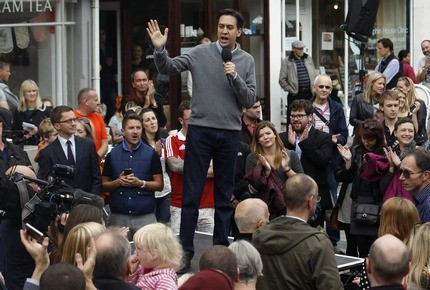Ed Miliband Running Out of Time to Persuade Party and Country He is PM Material

Little by little, Labour leader Ed Miliband is starting to reveal the policies he would introduce if elected prime minister in 2015.
So, on the eve of a crucial conference for his leadership and his party's election hopes, he has teased us with plans to scrap the bedroom tax, introduce an immigration bill, create more apprenticeships, strengthen an increased minimum wage with bigger fines for defaulters and boost child care provision.
We are told that, by the time of the next general election, this political dance of the seven veils will be complete and the final piece of silk will have been whipped away to reveal a comprehensive, costed manifesto.
The trouble is, many on his own side believe that Miliband is teasing just a bit too much, and that by the time he does finish his act, the audience will have stopped watching. They want him to get on with it.
Looking indecisive
Mapping out a full programme is always a real danger for an Opposition leader. Do it too soon and your opponents will steal your best policies and tear others to shreds, while voters become so accustomed to them they discount them on polling day.
On the other hand, wait too long and there is no time left to get your message across and you risk looking indecisive.
That dilemma was on full show on the opening day of the Brighton conference. Miliband was eager to push those new policies and hint at a couple more on the mansion tax, which might be levied on the full value of the property, and an EU referendum, which he just fell short of ruling out. He was even happy to describe himself as a socialist, whatever that now means to a Labour politician.
But the moment it came to more specific questions over taxation, any plans to change the top rate, for example, and how a Labour government would fund its new pledges, the answers were far from clear.
Miliband has said the scrapping of the hugely controversial bedroom tax, seen as a politically astute move, would be paid for by closing tax loopholes and shares-for-rights schemes.
But otherwise: "We will set out our tax plans at the election," he told the BBC's Andrew Marr Show.
It is the only sensible answer he can give, of course, but that won't stop it being used as a weapon by the Tories. They have already claimed that Treasury officials estimate Labour's spending commitments would create a £28bn black hole in the nation's finances, a suggestion dismissed as "nonsense" by Miliband. Quite what civil servants were doing addressing such an apparently political issue has already raised a few eyebrows.
It is likely there will be some other flesh placed on the policy bones during the conference and specifically in Miliband's big speech on Tuesday. He knows he will have to do something pretty good to win over doubters on his own side - a recent poll suggested one third of his own Labour councillors did not think he was the best man for the job - and start swinging the still-unconvinced electorate his way.
His big theme, and the one that will be at the heart of his election campaign, is around living standards. He has no alternative but to accept that the recovery is now under way and may be in full swing by the time of the poll, so he wants to switch attention to the claim that most ordinary people will not feel the benefits.
The Tories, he will say, have produced a late recovery and the wrong sort of recovery which will only help the wealthiest in society.
There remains the possibility that the memoirs by ex-Prime Minister Gordon Brown's spin doctor Damian McBride will continue to cast a shadow over the entire week.
Miliband attempted to distance himself from the revelations, insisting he had told Brown to sack McBride, and said he would never condone such back-stabbing and negative briefing. There had better be nothing to gainsay those statements.
As with all the party conferences now, the only event that truly matters is the leader's big set-piece speech, so all the party's hopes will be pinned on Miliband's performance on Tuesday afternoon.
He has a record of producing strong, popular conference speeches and it is widely expected he will deliver something special on Tuesday. But he also has a record of failing to follow through and underpin any advances made.
Now, with just 20 months to go to the general election, he needs to convince his party doubters and voters, who, polls suggest, remain unconvinced that he has the right stuff to lead the country.
© Copyright IBTimes 2025. All rights reserved.






















